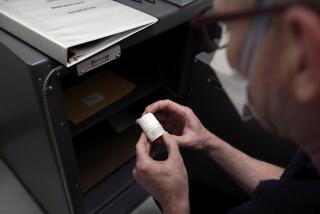Institute in Irvine to Assess Health Risks of Chemicals
- Share via
At a time when consumers are increasingly worried about the unknown chemical hazards in what they eat and drink, a unique Orange County research institute was established Wednesday to help assess those risks.
Scientists from around the country gathered in Irvine to launch the Institute for Evaluating Health Risks, the nation’s first independent, nonprofit agency designed to evaluate how dangerous certain chemicals are to consumers and in what amounts.
The new institute will be at the Beckman Center of the National Academies of Science and Engineering in Irvine, an arm of the Washington-based academy.
The institute is a response to California’s Proposition 65 toxics-control law, which requires businesses to warn consumers about toxic chemicals in amounts that pose a “significant risk” and bans discharge of such toxics into drinking water sources.
Scientists said they expect the institute to become the nation’s leading center for risk-assessment work because heretofore there have been no organizations that could provide comprehensive research on health-risk issues.
Few Chemicals Evaluated
At present, only a few of the 300 chemicals targeted by Proposition 65 have been evaluated by the federal government to determine what amounts pose a significant risk.
“If the institute is successful in providing good risk assessments, its impact will spread across the country,” said Charles Powers, founder of the institute and its acting director. “If crummy research is being conducted, it won’t work. What is defined by the industry as crummy is research done by the government. What the government defines as crummy is research done by industry. This institute is a means to get around that.”
Powers said that funding for the institute will come from both the public and private sector and that much of its work will include contracts with government and industry for specific chemical assessments.
Powers pointed out, however, that many elements--including how the agency is organized and what substances it will tackle first--must still be determined.
John A. Moore, who in September will become the institute’s executive director, said it must also determine the best way to separate itself from the political and economic biases of politicians and industry.
“When there is a new idea or a different way something can be done, one should point out in a cold, objective, coherent way what will be the impact of taking Option A or Option B. That is something this institute can and should do,” said Moore, who most recently served as the acting administrator of the U.S. Environmental Protection Agency.
Leaders in the environmental movement reacted cautiously to creation of the institute.
“I would like it to succeed,” said David B. Roe, an attorney for the Environmental Defense Fund and a principal author of Proposition 65. “It will depend on what jobs they take on and how quickly they produce results. I am skeptical because some industry groups have tried to co-opt scientific bodies, and they will certainly try to co-opt this one.”
But Roe said the composition of the institute’s board of directors will be an important factor in gaining support of environmentalists, as well as academic institutions, industry officials and government.
Board member Melvin Lane, publisher of Sunset Magazine, former chairman of the California Coastal Commission and a member of the advisory council of the Sierra Club, predicted that most environmentalists will welcome the institute.
“They need to be convinced that we are doing competent and intelligent work,” he said. “I think we will get enough government money to negate the perception of any conflict of interest.”
Under Proposition 65, the burden of proof for determining whether a risk is “significant” was shifted to industry, and that shift has created an urgent demand for speedy evaluation of chemicals and substances.
The shift has also changed the way that science looks at risk assessment and has prompted the need for a method to explain risks in a way that the public can understand, while also meeting the demands of industry, Powers said.
The institute “must be organized . . . with careful attention to becoming recognized as rendering its judgments . . . in ways that are objective, highly competent and understandable to the public which needs this information,” Powers emphasized.
Joining Lane on the board are Stanford University President Donald Kennedy; three University of California chancellors, Richard Atkinson of San Diego, Theodore Huller of Davis and Rosemary Schraer of Riverside; Hewlett-Packard chairman David Packard, and William Ballhaus, formerly chief executive officer of Beckman Instruments.
More to Read
Sign up for Essential California
The most important California stories and recommendations in your inbox every morning.
You may occasionally receive promotional content from the Los Angeles Times.











